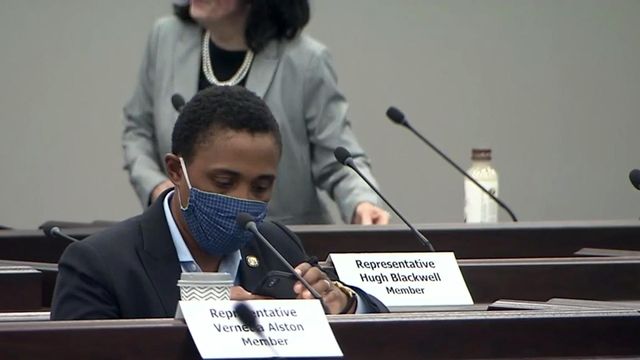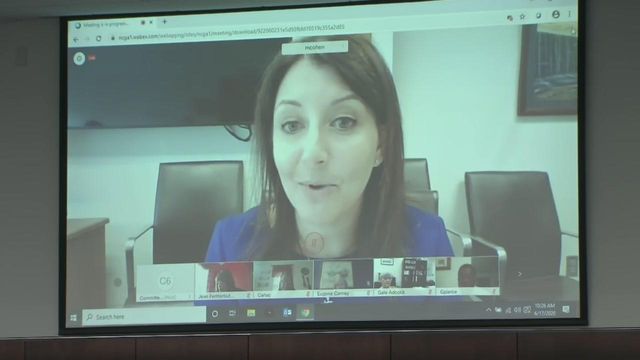DHHS chief says evidence shows masks, face coverings work to limit virus
Recent scientific studies prove that masks and face coverings are effective at preventing the spread of coronavirus, according to Dr. Mandy Cohen, secretary of the state Department of Health and Human Services.
Posted — UpdatedCohen briefed members of the House Health committee on Wednesday on new developments in continued coronavirus studies. Lawmakers also asked questions as they discuss new bills related to the pandemic.
There's been growing strife between lawmakers over wearing masks. Many legislators and most staffers aren't wearing them, even when they're close together.
"Why are you not wearing a mask? Why are you putting me and all of us at risk by not wearing a mask?" Rep. Graig Meyer, D-Orange, asked of a Republican colleague on the House floor this week.
Meyer said he sent a letter to House leaders three weeks ago asking for more safeguards, but he said he never got an answer.
Even in the House Health committee, most Republicans and staff weren't wearing masks Wednesday, while most Democrats were. There’s little social distancing, and the temperature checks at the entrance to the Legislative Building stopped this week.
"The fact that we don’t even take simple measures to keep each other safe, I think, says something about how the culture has changed in just the six years that I’ve been in the General Assembly," van Duyn said.
In response to Democratic concerns, Legislative Services Director Paul Coble, who oversees operations at the legislative complex, said temperature checks would resume next week.
Cohen told lawmakers that evidence is mounting that widespread mask wearing is an effective way to slow down the virus' spread, which could help get the state economy reopened more safely and more quickly.
"We’re not demonstrating that kind of [leadership] behavior here. We’re letting people think that this is over, and it is not," she said.
Other findings from recent coronavirus research includes the following, Cohen said:
- People are at lower risk of contracting COVID-19 while outdoors, largely due to airflow, sunlight and room for social distancing.
- People who are stationary in one place for a period of time are at higher risk of contracting COVID-19 than someone who is in motion.
- Coronavirus is spread from particles that come from the mouth and nose, so activities that involve shouting, singing or exercise are particularly risky.
- Direct sunlight and heat have been shown to kill the virus.
- The virus thrives in colder, indoor environments, like refrigerated meat-packing plants or even offices.
- While some people infect only one or two people at a time, people deemed "super spreaders" have been known to infect 100 people in one instance. Research on super spreaders and why they can infect so many is underway.
Lawmakers spent much of the meeting talking about problems in long-term care facilities.
WRAL's Data Trackers have determined 18 percent of confirmed coronavirus cases in North Carolina are in long-term care facilities. With the addition of prisons and other group homes, infections in congregate living settings goes up to 24 percent of the state total.
Deaths in congregate living facilities make up 68 percent of all COVID-19 fatalities.
Some House members said the state isn't doing enough to keep vulnerable residents safe. Others said protective measures in nursing homes are too restrictive, leaving residents and their families unable to see or touch each other.
Committee members urged Cohen to make changes immediately to allow visits in nursing homes and hospitals. But she explained that some of those restrictions are federal law, so the state has no control.
Cohen said she is extremely concerned about the virus problem in long-term care facilities and is looking for possible solutions.
Overall, nearly 46,300 people have been infected with the virus, but more than 29,200 have already recovered. More than 1,200 people have died statewide during the pandemic, and about 850 are hospitalized with COVID-19.
Experts say laboratory-confirmed cases of coronavirus are increasing in North Carolina, and it's not just because more people are being tested.
"These are worrisome signs, but our fate is not sealed," Cohen said. "There is a lot we can do."
State officials continue to preach the "three W's," she said. In addition to wearing a mask, they include frequently washing hands and waiting at least 6 feet apart from others in public.
• Credits
Copyright 2024 by Capitol Broadcasting Company. All rights reserved. This material may not be published, broadcast, rewritten or redistributed.






